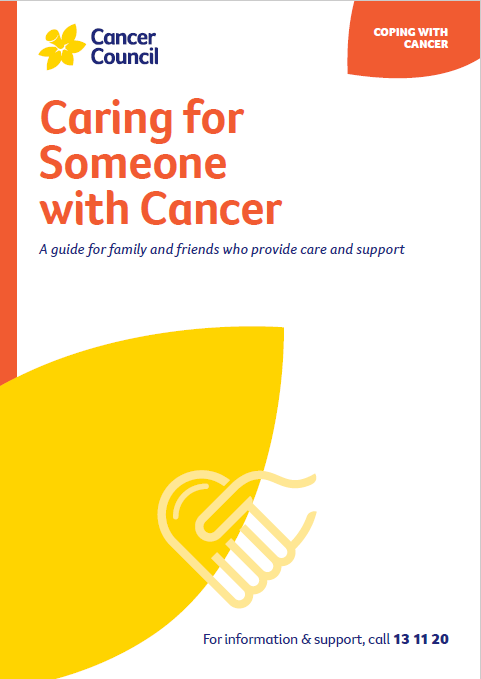- Home
- About Cancer
- Supporting someone with cancer
- Caring for someone with cancer
- Your role as a carer
- Providing medical care
- Your health care team
Your health care team
The multidisciplinary team (MDT) is there to support the person with cancer and their carers. Dealing with health professionals can be intimidating, especially if it’s something new for you. You may feel overwhelmed by all the new information or working out who to talk to about different issues.
Try keeping a notebook to record which members of the MDT are responsible for what area of care. You might need to make the initial contact with them if it doesn’t happen automatically. Having a key contact person in the MDT, such as a cancer care coordinator, can help you feel more comfortable.
To find cancer specialists, multidisciplinary teams and hospitals in NSW or ACT, you can visit the NSW Government website CanRefer.
Health professionals you might see
| general practitioner (GP) | assists with referrals and treatment decisions, and works in partnership with specialists to provide ongoing care |
| surgeon | surgically removes tumours and performs some biopsies; specialist cancer surgeons may be called surgical oncologists |
| medical oncologist | treats cancer with drug therapies such as chemotherapy, targeted therapy and immunotherapy (systemic treatment) |
| radiation oncologist | treats cancer by prescribing and overseeing a course of radiation therapy |
| haematologist | diagnoses and treats diseases of the bone marrow, blood and lymphatic system; prescribes chemotherapy and other drug therapies |
| nurse or nurse practitioner | administers drugs and provides care, information and support throughout treatment; a nurse practitioner works in an advanced nursing role and may prescribe some medicines and tests |
| cancer care coordinator | coordinates care, liaises with other members of the MDT, and supports the patient and family throughout treatment; care may also be coordinated by a clinical nurse consultant (CNC) or clinical nurse specialist (CNS) |
| community nurse | visits you at home to supervise medical treatment, assesses your needs for supportive care, and liaises with your GP and MDT as required |
| dietitian | helps with nutrition concerns and recommends changes to diet during treatment and recovery |
| social worker | links people to support services and helps people with cancer, and their carers and families, with emotional, practical and financial issues |
| counsellor, psychologist, psychiatrist | help people with cancer, and their carers and families, manage their emotional response to diagnosis and treatment |
| speech pathologist | evaluates and treats communication, voice and swallowing difficulties during and after treatment |
| physiotherapist, exercise physiologist | helps with restoring movement and mobility during and after treatment, returning to daily activities, and improving fitness and wellbeing |
| occupational therapist | helps people with cancer, their carers and families, manage everyday activities during and after treatment by suggesting ways to adapt the living and working environment with aids, equipment or strategies |
| spiritual care practitioner (pastoral care) | discusses spiritual matters and search for meaning, if appropriate; may arrange prayer services and other religious rituals |
| palliative care team | specialist doctors and nurses who work closely with the GP and cancer team to help control symptoms and maintain quality of life |
→ READ MORE: Monitoring symptoms and side effects
Podcast: How to Help Someone with Cancer
Listen to more of our podcast for people affected by cancer
Dr Alison White, Palliative Medicine Specialist, Royal Perth Hospital, WA; Tracey Bilson, Consumer; Louise Dillon, Consumer; Louise Durham, Nurse Practitioner, Palliative Care Outpatients, Princess Alexandra Hospital, QLD; Katrina Elias, Carers Program, South Western Sydney Local Health District, NSW Health, NSW; Jessica Elliott, Social Worker, Youth Cancer Services, Crown Princess Mary Cancer Centre, Westmead Hospital, NSW; Brendan Myhill, Social Worker and Bereavement Research Officer, Concord Repatriation General Hospital, NSW; Penny Neller, Project Coordinator, National Palliative Care Projects, Australian Centre for Health Law Research, Queensland University of Technology, QLD; Olivia Palac, Acting Assistant Director, Occupational Therapy, Gold Coast University Hospital, QLD; Nicole Rampton, Advanced Occupational Therapist, Cancer Services, Gold Coast University Hospital, QLD; Shirley Roberts, Nurse Consultant, Medical Oncology, Northern Adelaide Cancer Centre, SA; Dr Elysia Thornton-Benko, Specialist General Practitioner, and UNSW Research Fellow, NSW; Kathleen Wilkins, Consumer; Helen Zahra, Carers Program, South Western Sydney Local Health District, NSW Health, NSW.
View the Cancer Council NSW editorial policy.
View all publications or call 13 11 20 for free printed copies.
